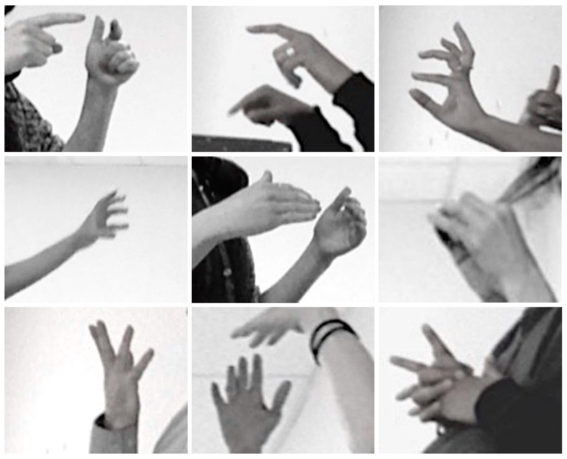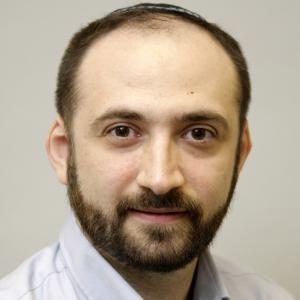This Wednesday, December 18 from 4pm-8pm, come celebrate with us our 2019 TMT Institute Fellows Sarah Dahnke, Mashuq Mushtaq Deen, Yoni Oppenheim, Gabrielle Revlock, and Sarah K. Williams. TMT’s Open Studios will feature installations, conversations, and performance experiments by our 2019 fellows and we’ll toast their work with a wine and cheese reception.
Check out our fellows’ Blog Interviews and RSVP to our Open Studios today.

Over the last year, Sarah K Williams has been exploring alternative forms of communication through gestural meditations and repetitive recitations, motivated by a desire to become more comfortable with sincere displays of openness and vulnerability. Eliminating the object for the first time—a thing so comforting in its familiarity as a visual artist—Sarah will present a series of short duets in defense of gesture and mumbled half-sentences as an effective form of deep connection.
Target Margin Theater (TMT): What inspired you to apply to Target Margin Theater’s Institute?
Sarah K Williams(SW): My first attraction was to the openness of the program to genres of making beyond theater. As one with a visual arts background, I am conscious of thinking differently about making things than artists working in a theatrical setting. I come with a different set of priorities, I am not used to using my body, my voice, my sense of material comes from objects and textures outside of myself, not as a result of interacting with other people in a space. I make an effort to surround myself with people with a totally different knowledge base than my own. That, to me, is one of the most valuable things I can do as an artist—to venture outside of my immediate creative community, to put myself in uncomfortable and challenging situations. TMT promised to do this, so I applied.
TMT: How would you describe your fellowship experience?
SW: My experience as a Fellow was certainly a creative challenge. I was pushed to expand my definition of productivity. The experience of being a willing participant in other people’s investigations is a new roll for me and it depends on an openness and acceptance of unfiltered collaborative exploration which is unfamiliar to me in my own practice. I like to know how things might end up. It’s a valuable challenge to have to adapt to other artist’s structure of exploration.
TMT: How has the Institute impacted your art practice?
SW: I think this experience has made me less self-conscious about approaching projects without a clear direction, just figuring things out together in a space. As an object maker, my most comfortable process is creating something in private, finishing that thing, and only then presenting it to an audience. This Institute is NOT that. This year, we were pushed to just try things out, to not fear failure, to be specific about our intentions as an investigation with potential, not as a project. The process to get somewhere was left wide (and terrifyingly) open!
TMT: What did you carry with you into the program? What are you leaving behind? Or taking with you?
SW: I’m taking with me a more open attitude on collaboration and a willingness to relinquish (some) control. I was also exposed to a huge amount of new material over our excursions and breakfasts which I can’t wait to delve into deeper this next year. Getting to know the other Fellows was truly inspiring. I look forward to following everyone’s work as we part ways and discover seeds of things in future projects which we all first explored together as an Institute.
Sarah K Williams is a multi-disciplinary artist working between sculpture and performance, attracted to the musicality of instruction and the theatricality of the mundane. Her work often involves edible material, unnecessarily complicated systems of construction, or scores for object movement and manipulation. Recent residencies include Studios at MASS MoCA, AIM at the Bronx Museum, Vermont Studio Center Fellowship, Ox-Bow, and the Sharpe-Walentas Studio Program. She is the founder and director of Sprechgesang Institute, a collaborative project-based platform for artists working in an in-between language of two or more disciplines.

Yoni Oppenheim is investigating the impossibilities and possibilities of authentic Jewish performance. What might a non-mimetic form of theater look like? What happens when the line between spectator and performer is erased? When his father passed away suddenly in June, Yoni – an Orthodox Jew – was thrown into the heretofore hidden reality of Jewish mourning rituals. His inquiry has since centered on questions of memory and mourning as they relate to his daily performance of these rituals – incorporating time-specific journeys by ferry, by foot and curated museum experiences connected to the memory of his father.
Target Margin Theater (TMT): What inspired you to apply to Target Margin Theater’s Institute?
Yoni Oppenheim(YO): The TMT Institute has been on my radar since its founding several years ago. For a long time I have been carrying with me questions about my artistic practice. Last year they felt particularly urgent and I turned to the TMT Institute to help think through them. I had reached the point as an artist where exploring those questions with other artists and through disruption would be best.
TMT: How would you describe your fellowship experience?
YO: It has been a gift. Being in a community of 4 other artists from diverse artistic disciplines has been eye opening. David and Moe have been wonderful. David has shown us a working method to investigate questions that forces me to be very articulate and very specific, and to do so very quickly, about questions that can otherwise easily remain in an amorphous haze. I have been surprised how informative to my own investigation the work of the other TMT Institute artists has been. I can’t describe the Institute without mentioning food. I keep kosher, and since I started working in the theater, I have never encountered an institution that has been so sensitive to inclusivity, finding kosher food for me and taking the entire cohort to kosher eateries whenever feasible to ensure that I am included in all aspects of our work together. It started on the very first day, when David brought in a bottle of kosher wine and has continued since. I am surprised how moved I have been by their efforts.
TMT: How has the Institute impacted your art practice?
YO: I just closed a production on Sunday. I directed two short plays, one of which I had translated to English from Hebrew. A mentor of mine had translated the other play, and was due to direct it as well. The preparation for this production started over a year ago – applying and being awarded a Creative Engagement grant from the Lower Manhattan Cultural Council (LMCC), working with the playwright, finding performance and rehearsal space, actors, designers and all the rest. Unfortunately in late September he had to back out, and I stepped into directing the second play. With little time otherwise to prepare for it, I relied heavily on my work in the Institute to decide how to direct the production.
TMT: What did you carry with you into the program? What are you leaving behind? Or taking with you?
YO: The institute required us to be the material in one another’s investigations. I haven’t taken on any performative role since theater school, where it was required. I am a director in part because I like others to be the focus of my work – not myself. I hate performing and have terrible stage fright. For my current investigation, I am challenging myself by being both the subject and object of the work. Those attending the Open Studio will encounter me and my story. As I leave the Institute I am taking with me a new mode of working and am striving to put aside fear. I have also gained a feeling of community and kinship to the four other Institute fellows, to Moe, David and the Target Margin Theater community at large.
Yoni Oppenheim is the Artistic Director of 24/6: A Jewish Theater Company. He is staging his translation of Israeli playwright Dani Horowitz’s Last Tree in Jerusalem alongside Horowitz’s A Page of Talmud at TheaterLab Dec. 4-15th. He conceived and directed Looking Through Glass by Ken Kaissar, and adaptations of A Doll House and Uncle Vanya. Yoni was dramaturg to: Doug Wright on the world premiere of Posterity (Atlantic Theater); Hamish Linklater on Paris, Actors, and Witness Relocation/Dan Safer on Haggadah (La MaMa). He has devised performances with seniors and youth. Yoni is a member of Lincoln Center Theater’s Directors Lab. He holds a B.F.A. in Drama (NYU-Tisch) and an M. Phil in Ibsen Studies (University of Oslo). TwentyFourSix